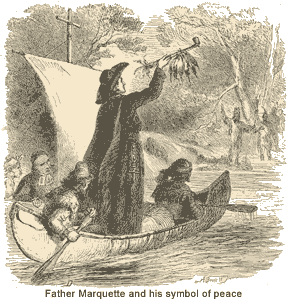Father Marquette, a Jesuit priest, missionary and explorer, was instrumental in expanding French influence in early New France. He was born in the northern French city of Laon, where his strong religious convictions blended with a fascination with faraway places, making him a likely candidate for membership in the Society of Jesus.
In 1666, he was assigned to North America, where he first ventured to Quebec and later into the interior to master native languages. Marquette founded a mission at Sault Sainte-Marie and later was sent as a missionary to the Ottawa.
 Marquette accompanied the Ottawa and their Huron neighbors as they retreated from the advancing Sioux. A new mission was established at Point St. Ignace at the junction of lakes Michigan and Huron.
Marquette accompanied the Ottawa and their Huron neighbors as they retreated from the advancing Sioux. A new mission was established at Point St. Ignace at the junction of lakes Michigan and Huron.
In 1671, Marquette met the famed French explorer, Louis Jolliet. Both men had heard rumors about the existence of a great south-flowing river located somewhere in the west. A joint effort to find that body of water was halted by tribal warfare in the area. However, two years later, Count Frontenac, the governor of New France, provided backing for Marquette and Jolliet to pursue their endeavor.
Sharing command of a small party, the explorers crossed Lake Michigan by canoe, pushed west up the Fox River, portaged to the Wisconsin River and then paddled into the Mississippi. They drifted south, passing the confluence with the Ohio River, but later stopped near the mouth of the Arkansas River. Marquette and Jolliet were confident that the Mississippi eventually emptied into the Gulf of Mexico, but feared falling into Spanish hands if they continued.
Having established a French claim to the Mississippi Valley, Marquette resumed his missionary work. He died at the young age of 38, but left behind a written account of his explorations that would be published in 1681.